light
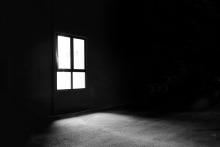
As a listener in this space, I choose to sit with them no matter where they are sitting — in the dark or in the light. And maybe, not surprisingly, I have learned more from sitting in the darkness with them. We have all learned by dwelling there. God abides with us as we sit in the darkness. We do not sit alone. The creator of darkness s sits with us. We feel to the marrow of our bones God’s abiding presence. We also know that darkness does not have the final word — light does. . If we will but wait long enough, eventually the sun will come up and the darkness will end.

Let the oppressed go free, share your bread with the hungry, bring the homeless poor into your house, cover the naked, and don’t hide from your own kin.
That’s something to print on cups for next year’s Super Bowl. That’s the way God calls us to live. That’s what Jesus meant when he called us to be salt and light.
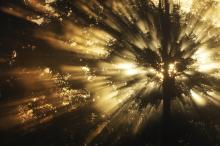
On election night, I hunkered down in my living room, eyes glued to the television, waiting for the announcement. When talking heads announced that Hillary Clinton conceded the election to Donald Trump, my body shook — literally. I could not control it. I had never experienced anything like it. A cry rose from the pit of my stomach and quickly turned into a primal scream.
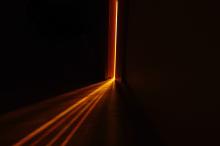
Ultimately, we learn to overlook the light already present in these places. We come to think that our responsibility is to bring light when instead we should bear witness to a flame that already exists. In reality, where God is, there is light. If this whole created earth belongs to the Lord, there is no place his light doesn’t send forth a warm glow.
I used to volunteer with an organization called PEER Servants. PEER is an acronym for Partnering for Economic Empowerment and Renewal. PEER Servants partners with indigenous Christian microfinance institutions that want to help transform their communities and empower others to do the same. During my time as a volunteer, I learned about a woman in South Africa who used the profits from her business to begin a nursery school for her community. I read about a man in Uganda who wanted to expand his business so he could provide more jobs for his neighbors. These stories spread hope to my North Carolina home, a hope as warm as a rising sun.
In the first chapter of the biblical book of John, Nathanael says to Phillip, “Can anything good come out of Nazareth?” to which Phillip answers, “Come and see.”
Based on the typical narrative the West gives the African countries, the question might become, “Can anything good come out of the African continent?” And I would answer, “Come and see.”

I am more and more convinced that beauty lies in the margins.
Raised in evangelicalism, we often prayed to reach those who remain in the darkness, that God would open their eyes and see the truth. We had been born again. A veil had been magically lifted off our eyes, welcoming us into the land of all that is bright and right. Like the blind man in the Gospel of John, we proclaim, “I was blind, but now I see.” Those who believe now possess some sort of special knowledge inaccessible to others, and we are tasked to go and lift the blinders off as many as possible.
It sounds a bit arrogant, which has been a common accusation against evangelical Christians. But every conversion experience is a form of turning from darkness to light. An a-ha moment, a lived miracle, a season of wrestling with doubt and crisis that somehow brought the person to a divine encounter with God. These stories ought to be honored and not dismissed. Something has changed, and it is worth celebrating a liberation into hope. I marvel at genuine, earnest faith.
The problem is when we have become blinded by our light.
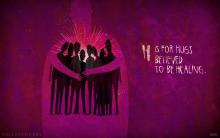
As a native New Yorker, I can never forget Tuesday, September 11, 2001. I was in college, but heading to my part-time job that morning. My car was being fixed, so my father drove me to work. There was an unusual amount of traffic and as we turned on the radio, we heard a reporter talk about a plane that hit the World Trade Center.
The first thought we had was that this was an accident. It had to be an accident, right? As we listened to the reports though, the second plane hit and it was clear that something was very, horribly, terrifyingly wrong.
From our office in Queens, we watched the towers burn and then collapse. The image of the great cloud of smoke and debris encompassing the skyline has been burned on my brain. And a few days later, while handing out sandwiches to mourners at the makeshift memorial at Union Square with my parents’ church and non-profit organization, the feeling of hugging a total stranger while she wept on my shoulder will never leave me.
It is impossible to forget.
I must admit the timeliness on the part of HBO to air the season finale of The Leftovers in the week of 9/11. Tom Perotta, who authored the play on which the show is based, purposely included allusions to 9/11. Rather than a theological treatise on the Rapture, it is a beautiful case study in grief and the excruciating tension between the desire to move forward and the need to remember.

A QUESTION ASKED of me 100 times in the last 10 years: Why do you stay in the Catholic Church? How can you stay in a church where thousands of children were raped around the world? Where men in power covered their ears to the screams of children and moved the rapists around from parish to parish so that smiling welcoming parents presented their awed shy children to the rapists like fresh meat? Where women have been marginalized and sidelined for centuries and their incredible creativity diluted and wasted and left to rot? Where power and greed and cowardice so often trumped the very humility and mercy and defiant belief in the primacy of love on which the church was founded and for which it claims to stand today?
Because, I said haltingly, in the beginning, when I was unsure of my honest answer in the face of such rapacious crime and breathtaking lies, because, because ... because how could I quit now? What sort of rat leaves the ship when it is foundering and your fellow passengers need help? Why would I quit now, of all the times to quit? How could I leave the ship in the hands of the men who nearly sank her? How could I abandon the brave honest mothers and priests and nuns and teachers and bishops and dads and monks and children who are the church, who compose the church, who sing the deepest holiest song of the real church?
Because, I said more and more energetically as the years went by, because there are men like my archbishop in my church, men who stood up to lies and crime and accepted the lash of public insult without a word, though the sins were not theirs.
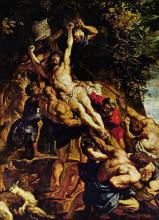
The back-lit morning wave
Clarified emerald suddenly in olive,
Then gone; forever the cry of the Christ's torso
In Rubens' "Elevation of the Cross";
A glass pepper shaker filled to overflowing
By a finger of fallen sun at the close
Of a most mundane afternoon.
Obsessed is perhaps too strong a wod

FOR MORE THAN two centuries, the United States has been the proudest example of democracy in the world. Maybe not the best, but definitely the proudest. Oh sure, we’ve hit some rough patches over the decades, mainly in dealing with our native peoples and other ethnic minorities. Also with women, the poor, the falsely accused, the unemployed, and people who aren’t bankers. But let’s just call those growing pains.
For the most part, America has been that shining city on a hill, and by America, of course, I don’t mean Canada or Mexico, or the other countries whose names I forget, most of which don’t have many good hills to shine from anyway.
But I’m not talking about geography, I’m talking about pride. The pride that comes from being number one in democracy, despite being number 55th in infant mortality and 35th in math. Okay, so we don’t test well. But we’re proud anyway. And we’re still number one in Bible science! [High five!]
But lately, because of continued dysfunction on Capitol Hill, people are starting to whisper that democracy in the United States may have lost some of its shine, like we’re “hiding it under a bushel,” as it says in the old Christian campfire song of my youth. (We also sang “With Jesus in My Boat I Can Ride Out the Current Economic Downturn,” and “Children, Go Where I Text Thee.”)
But if America’s “little light” is no longer shining, at least a few other nations are providing good examples of self-government.
On Feb. 8, tens of thousands of people gathered in the North Carolina capital city, Raleigh, for what organizers called the Moral March. It was a follow-up to last year’s “Moral Monday” movement that started in April 2013 when Rev. William Barber II, president of the North Carolina NAACP, and 16 others were arrested inside the North Carolina legislature for protesting sweeping voting restrictions proposed by the Republican-controlled state government.
I ALMOST DIDN’T go to the Moral March. I kept looking for excuses. There was all that work to be done for next week. I told my professor I’d miss Friday’s preaching class. I hoped she’d chide me and I’d feel guilty enough to stay. Instead she said, “Great, go with my blessing.” I told my tutor I’d miss tutorial. She said, “I’m so glad you’re going to the march.”
Why couldn’t I go to a normal graduate school where no one left their rooms? But instead I went to seminary, and to Union, of all places!
I said, God, I’m crazy to go. Mild laughter was the only response. I glared at my reflection in the dark window. The reflection raised her eyebrow and said, don’t be left behind now.
The little voice in the window stayed with me as I put an extra pair of thick socks in my bag. Don’t be left behind, reading books about other people’s marches and other people’s spiritual revelations and other people’s religions. This march is historic, my reflection informed me. Go and be part of history. This is your history.
This is your time.

Light is important to us. Those of us who live in the Midwest are reminded of how much we need it during this time of year. The sun sets early. On so many days, our sunlight is tinged with gray as it seeps through the clouds.
Light seems to be in short supply.
All of the festive holiday Christmas lights have been put away, leaving the darkness unchecked. We recently had religious celebrations that involved lighting candles on our menorahs, on our advent wreaths and our dinner tables. Many people celebrated the birth of a Jewish rabbi who urges everyone to be a light to the world.
Don’t wait for someone else to bring the light. Be the light.
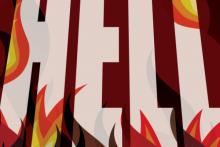
I GREW UP IN THE BAPTIST CHURCH, memorizing scripture as part of our “sword drills” and arming myself with the necessary tools to convert my friends to the side of righteousness. I was taught that the Earth was 5,000 years old, that scientists fabricated the fossil record to fit their agenda, and that some people—really, most people—were going to hell.
I remember waking up, shaking in my bed from dreams of the hungry flames of hell licking at my heels. My daily decisions were increasingly governed by fear and guilt rather than by love or a sense of what was right.
Where do our contemporary ideas about hell come from? First, we have to consider what it is we’re talking about when we say “hell.” Is it effectively the same as the annihilation of the soul, when one ceases to exist, even in the spiritual sense? Is it less physical and more of a conscious torment, where we, bound by our sins, spend eternity aware only of our irreconcilable separation from God?
Blue Like Jazz author Donald Miller says, “If the religious fundamentalists are right, heaven will be hell. And almost nobody will be there.” Rob Bell, best known for his bestselling book Love Wins, stirred up a tidal wave of controversy not so much for suggesting there wasn’t a hell, but for suggesting a loving God would ensure that such a place would sit empty.
IN THE OLD TESTAMENT, the word “hell” appears 31 times. The phrase “the grave” is used 31 times, and “the pit” comes in at a distant third with three appearances. But all 65 instances of these words throughout the first 39 books of the Bible come from the same Hebrew word, Sheol.
In the Jewish tradition, Sheol is a resting place for the dead. While some believe this is the same as hell, there are indications to the contrary. In the ancient Jewish tradition, Sheol is a place of rest for both righteous and wicked, with no distinction.

Editor's Note: New Vision Renewable Energy connects Christians with opportunities to provide renewable solar lights to people in the developing world. Their Christmas Lights Advent Devotional features daily readings and questions from prominent Christian thinkers, including Sojourners president Jim Wallis. This Day 10 of Advent devotional from Jim Wallis is reprinted and adapted with permission of New Vision Renewable Energy. You can find the full Christmas Lights Advent Devotional guide and solar light kits here: http://nvre.org/devotional-order.html
Proclaiming Jesus as light of the world is an audacious statement. It directly challenges all those idols that persistently attempt to replace God as the center of our lives and our world. In our culture, a selfishness that denies any obligation to anyone or anything beyond our own self-interest may be the greatest idol of all. It denies that demanding more and more energy at great cost to our environment and the people who live close to the land has problematic consequences. We have lost sight of the common good and the consequences have been devastating.
In many places, hope has turned into despair. Darkness seems to be crowding out light. From where will our help come from?

THOSE WHO BELIEVE in freedom and work for justice in our world sometimes grow nostalgic about the 1960s in this country, looking back at the leadership that emerged from African-American churches in the South, drawing allies from outside the region and beyond the bounds of creed. America has a vivid, living memory of faith inspiring public justice. But the civil rights movement did not just happen. The March on Washington and Selma were moments in history made possible by movements that grew out of hard work over the course of decades.
This summer in North Carolina, “Moral Mondays” at the state General Assembly have drawn thousands of weekly protesters, more than 800 of whom have been arrested for engaging in mass civil disobedience. A few weeks into the campaign, some elders started saying it felt like the ’60s all over again. The Washington Post highlighted NAACP state chapter president Rev. William Barber’s dynamic preaching. The New York Times pointed to the significance of hundreds of clergy uniting to lead the movement. MSNBC andFox News set up their satellite trucks. Week after week, thousands of people kept coming.
When reporters asked why, participants explained the concerns: 500,000 people denied health care when the legislature refused federal funds for Medicaid expansion, 70,000 people whose unemployment insurance was cut off, thousands of poor families denied an earned income tax credit, wholesale repeal of the hard-won Racial Justice Act, and diversion of public education funds through a voucher program. The reasons were legion, but they were not, by and large, unique to North Carolina. They were the sort of changes the American Legislative Exchange Council (ALEC) promotes at the state level throughout the country. How, then, did this grassroots resistance movement emerge in North Carolina?
On my knees I beg forgiveness for my greed—
and for starving myself.
By your eyes I see you love this priest,
follow his lyrical fingers in praise of
a small white host he points here,
there.
DREAMS CAN serve a powerful purpose. Jacob dreamed a ladder and was renamed Israel. Joseph dreamed the sun and moon and stars and was sold into slavery. The magi dreamed a warning and returned home by way of another road.
Years ago I had a dream. I sat, a child, on a dirt floor. Around me paced a horse, saddled, ready. In front stood an immense door, cathedral-tall and brooding. And though open, the space within was dark. I was holding a light. And in the dream, I knew we were to bring light into that darkness. And the darkness—the darkness was the church.
In Truth Speaks to Power: The Countercultural Nature of Scripture, Walter Brueggemann, professor emeritus of Old Testament at Columbia Theological Seminary, bears light to the exegetical (seminary lingo for interpretive) work and examination of the interplay between truth and power found in both familiar and less familiar narratives of Old Testament scripture. Rigorous in content, the read is nevertheless accessible to scholar and novice alike.
Brueggemann's concern with the interplay of truth and power rests on the observation that far too often truth, even biblical truth, is found colluding with and legitimizing the self-serving and self-preserving agenda of totalistic and monopolizing authorities. To use biblical imagery, truth sides with the Pharaohs and the Solomons of the world and not with those on its margins and periphery.
The first two chapters draw on Brueggemann's impressive scholarship of Old Testament text and narrative to paint a disconcerting picture where not only are the bad guys truly bad, the good guys aren't any better. Take Joseph, the Technicolor-dreamer-slave become all-powerful-vizier (think prime minister) of Egypt. It is Joseph's land acquisition scheme, strategically implemented amid drought and famine, that results in Pharaoh controlling most of Egypt's wealth. It is Joseph who creates a permanent peasant underclass—the very class that will cry out for liberation from the injustice of having to bake bricks with no straw. And Solomon—well, you know something's gone terribly amiss when your empire accumulates "six hundred sixty-six talents of gold" (1 Kings 10:14) each year. If you don't see the editorial subtext, write it out numerically. Ouch!
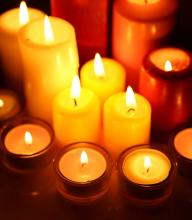
You wait a long time for Christmas morning
drifting asleep even as the ebony slate of sky
shatters in clarion silence
Glory, Hallelujah!
and shepherds in the hills cast down their rods
look up at angels and find themselves
no longer huddled in darkness
but lucent between the stars.

Activist theologian Bill Wylie-Kellermann wrote that the Epiphany season "begins and ends in light. From the heavenly star to the radiant robes of transfiguration, Epiphany is about revelation, the kind of sudden brightness that lights up the landscape of a mind or a community or a whole social order. The light reveals, but not passively; it summons and sends."
In popular understanding, of course, Epiphany is about the visit of the Magi, "wise men" from the East bearing gifts for the newborn Christ child. Since these Gentile visitors come from foreign lands, their search for Jesus and their homage to him have stood as sign and symbol that Christ's salvation knows no boundaries. (The parallels with our age, with the potential of digital media to transcend all boundaries, begin to suggest themselves.)
The story of the Magi has a dark side as well, mostly ignored in Christendom's celebration of Epiphany. On their way to find the babe, the travelers pay a visit first to Herod's court, where they're told to report back to him the location of the newborn. Fortunately, the wise men practice direct civil disobedience to the royal command, and thus they and the holy family escape Herod's wrath. But the children of Bethlehem, the "holy innocents," suffer the tragic consequences of Herod's duplicity. The lessons about relating to authority (i.e., the need to be "wise as serpents") are loud and clear.
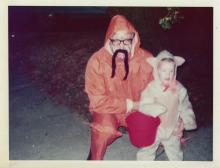
One of my most vivid childhood memories of Halloween 1977, the year my family moved to a new town in Connecticut right after the school year had begun. I don't recall what my costume was, but I do remember going door-to-door with my father, meeting new neighbors and collecting a heavy bag of candy, as the suburban warren of Cape Cods and manicured lawns morphed into an other-worldly fairyland.
I was 7 years old and the new kid on the block, so when the cover of darkness fell at sunset, I hadn't a clue where I was. As my father deftly navigated our way home in the crisp autumn night, it felt like he had performed a magic trick. When the morning came, I couldn't believe that our adventure the night before had been on these same streets. To my young imagination (and heart) it felt as if we had been walking through Narnia or Rivendell rather than a sleepy New England suburb.
A few years after that, my family stopped celebrating Halloween. We had become born-again Christians and our Southern Baptist church frowned on the practice. Halloween, I was taught, was an occult holiday (or maybe even Satanic!) and good Christians should have nothing to do with it.